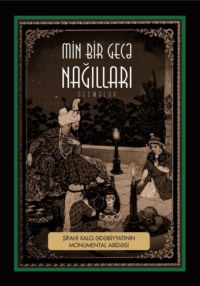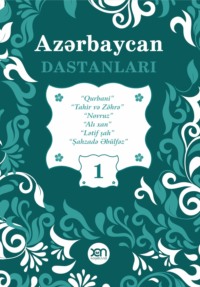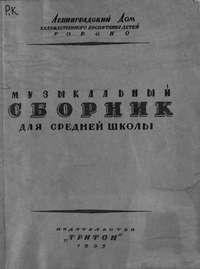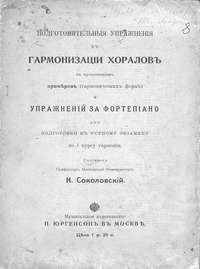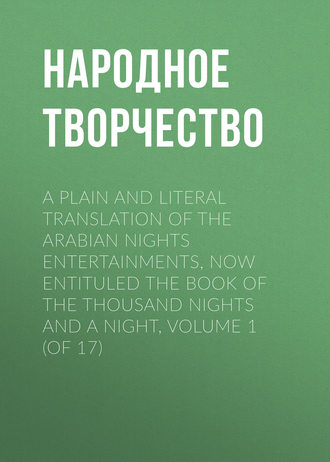 полная версия
полная версияA plain and literal translation of the Arabian nights entertainments, now entituled The Book of the Thousand Nights and a Night, Volume 1 (of 17)
168
The "Kalandar" disfigures himself in this manner to show "mortification."
169
Arab. "Gharíb: " the porter is offended because the word implies "poor devil;" esp. one out of his own country.
170
A religious mendicant generally.
171
Very scandalous to Moslem "respectability": Mohammed said the house was accursed when the voices of women could be heard out of doors. Moreover the neighbours have a right to interfere and abate the scandal.
172
I need hardly say that these are both historical personages; they will often be mentioned, and Ja'afar will be noticed in the terminal Essay.
173
Arab. "Sama'an wa tá'atan;" a popular phrase of assent generally translated "to hear is to obey;" but this formula may be and must be greatly varied. In places it means "Hearing (the word of Allah) and obeying" (His prophet, viceregent, etc.)
174
Arab. "Sawáb"=reward in Heaven. This word for which we have no equivalent has been naturalised in all tongues (e. g. Hindostani) spoken by Moslems.
175
Wine-drinking, at all times forbidden to Moslems, vitiates the Pilgrimage-rite: the Pilgrim is vowed to a strict observance of the ceremonial law and many men date their "reformation" from the "Hajj." Pilgrimage, iii., 126.
176
Here some change has been necessary; as the original text confuses the three "ladies."
177
In Arab-the plural masc. is used by way of modesty when a girl addresses her lover; and for the same reason she speaks of herself as a man.
178
Arab. "Al-Na'im;" in full "Jannat al-Na'im"=the Garden of Delights, i. e. the fifth Heaven made of white silver. The generic name of Heaven (the place of reward) is "Jannat," lit. a garden; "Firdaus" being evidently derived from the Persian through the Greek παράδεισος, and meaning a chase, a hunting-park. Writers on this subject should bear in mind Mandeville's modesty, "Of Paradise I cannot speak properly, for I was not there."
179
Arab. "Mikra'ah," the dried mid-rib of a date-frond used for many purposes, especially the bastinado.
180
According to Lane (i., 229) these and the immediately following verses are from an ode by Ibn Sahl al-Ishbili. They are in the Bul. Edit. not the Mac. Edit.
181
The original is full of conceits and plays on words which are not easily rendered in English.
182
Arab. "Tarjumán," same root as Chald. Targum (=a translation), the old "Truchman," and through the Ital. "tergomano" our "Dragoman;" here a messenger.
183
Lit. the "person of the eyes," our "babe of the eyes," a favourite poetical conceit in all tongues; much used by the Elizabethans, but now neglected as a silly kind of conceit. See Night ccix.
184
Arab. "Sár" (Thár) the revenge-right recognised by law and custom (Pilgrimage, iii., 69)
185
That is "We all swim in the same boat."
186
Ja'afar ever acts, on such occasions, the part of a wise and sensible man compelled to join in a foolish frolic. He contrasts strongly with the Caliph, a headstrong despot who will not be gainsaid, whatever be the whim of the moment. But Easterns would look upon this as a proof of his "kingliness."
187
Arab. "Wa'l-Salám" (pronounce Was-Salám); meaning "and here ends the matter." In our slang we say, "All right, and the child's name is Antony."
188
This is a favourite jingle; the play being upon "ibrat" (a needle-graver) and "'ibrat" (an example, a warning).
189
That is "make his bow;" as the English peasant pulls his forelock. Lane (i., 249) suggests, as an afterthought, that it means: – "Recover thy senses; in allusion to a person's drawing his hand over his head after sleep or a fit." But it occurs elsewhere in the sense of "cut thy stick."
190
This would be a separate building like our family tomb and probably domed, resembling that mentioned in "The King of the Black Islands." Europeans usually call it "a little Wali;" or, as they write it, "Wely;" the contained for the container; the "Santon" for the "Santon's tomb." I have noticed this curious confusion (which begins with Robinson, i. 322) in "Unexplored Syria," i. 161.
191
Arab. "Wiswás;"=diabolical temptation or suggestion. The "Wiswásí" is a man with scruples (scrupulus, a pebble in the shoe), e. g. one who fears that his ablutions were deficient, etc.
192
Arab. "Katf"=pinioning by tying the arms behind the back and shoulders (Kitf), a dire disgrace to freeborn men.
193
Arab. "Nafs."=Heb. Nephesh (Nafash)=soul, life; as opposed to "Ruach"=spirit and breath. In these places it is equivalent to "I said to myself." Another form of the root is "Nafas," breath, with an idea of inspiration: so "Sáhib Nafas" (=master of breath) is a minor saint who heals by expiration, a matter familiar to mesmerists (Pilgrimage, i. 86).
194
Arab. "Kaus al-Banduk;" the "pellet-bow" of modern India; with two strings joined by a bit of cloth which supports a ball of dry clay or stone. It is chiefly used for birding.
195
In the East blinding was a common practice, especially in the case of junior princes not required as heirs. A deep perpendicular incision was made down each corner of the eyes; the lids were lifted and the balls removed by cutting the optic nerve and the muscles. The later Caliphs blinded their victims by passing a red-hot sword blade close to the orbit or a needle over the eyeball. About the same time in Europe the operation was performed with a heated metal basin – the well-known bacinare (used by Ariosto), as happened to Pier delle Vigne (Petrus de Vineâ), the "godfather of modern Italian."
196
Arab. "Khinzír" (by Europeans pronounced "Hanzír"), prop. a wild-boar; but popularly used like our "you pig!"
197
Striking with the shoe, the pipe-stick and similar articles is highly insulting, because they are not made, like whips and scourges, for such purpose. Here the East and the West differ diametrically. "Wounds which are given by instruments which are in one's hands by chance do not disgrace a man," says Cervantes (D. Q. i., chapt. 15), and goes on to prove that if a Zapatero (cobbler) cudgel another with his form or last, the latter must not consider himself cudgelled. The reverse in the East where a blow of a pipe-stick cost Mahommed Ali Pasna's son his life: Ishmail Pasha was burned to death by Malik Nimr, chief of Shendy (Pilgrimage, i., 203). Moreover, the actual wound is less considered in Moslem law than the instrument which caused it: so sticks and stones are venial weapons, whilst sword and dagger, gun and pistol are felonious. See ibid. (i., 336) for a note upon the weapons with which nations are policed.
198
Incest is now abominable everywhere except amongst the overcrowded poor of great and civilised cities. Yet such unions were common and lawful amongst ancient and highly cultivated peoples, as the Egyptians (Isis and Osiris), Assyrians and ancient Persians. Physiologically they are injurious only when the parents have constitutional defects: if both are sound, the issue, as amongst the so-called "lower animals," is viable and healthy.
199
Dwellers in the Northern Temperates can hardly imagine what a dust-storm is in sun-parched tropical lands. In Sind we were often obliged to use candles at midday, while above the dust was a sun that would roast an egg.
200
Arab. "'Urban," now always used of the wild people, whom the French have taught us to call les Bedouins; "Badw" being a waste or desert; and Badawi (fem. Badawíyah, plur. Badáwi and Bidwán), a man of the waste. Europeans have also learnt to miscall the Egyptians "Arabs": the difference is as great as between an Englishman and a Spaniard. Arabs proper divide their race into sundry successive families. "The Arab al-Arabá" (or al-Aribah, or al-Urubíyat) are the autochthones, prehistoric, proto-historic and extinct tribes; for instance, a few of the Adites who being at Meccah escaped the destruction of their wicked nation, but mingled with other classes. The "Arab al-Muta'arribah," (Arabised Arabs) are the first advenæ represented by such noble strains as the Koraysh (Koreish), some still surviving. The "Arab al-Musta'aribah," (insititious, naturalised or instituted Arabs, men who claim to be Arabs) are Arabs like the Sinaites, the Egyptians and the Maroccans descended by intermarriage with other races. Hence our "Mosarabians" and the "Marrabais" of Rabelais (not, "a word compounded of Maurus and Arabs"). Some genealogists, however, make the Muta'arribah descendants of Kahtan (possible the Joktan of Genesis x., a comparatively modern document, B.C. 700?); and the Musta'aribah those descended from Adnán the origin of Arab genealogy. And, lastly, are the "Arab al-Musta'ajimah," barbarised Arabs, like the present population of Meccah and Al-Medinah. Besides these there are other tribes whose origin is still unknown; such as the Mahrah tribes of Hazramaut, the "Akhdám" (=serviles) of Oman (Maskat); and the "Ebná" of Al-Yaman: Ibn Ishak supposes the latter to be descended from the Persian soldiers of Anushirwan who expelled the Abyssinian invader from Southern Arabia. (Pilgrimage, iii., 31, etc.).
201
Arab. "Amír al-Muuminín." The title was assumed by the Caliph Omar to obviate the inconvenience of calling himself "Khalífah" (successor) of the Khalífah of the Apostle of Allah (i. e. Abu Bakr); which after a few generations would become impossible. It means "Emir (chief or prince) of the Muumins;" men who hold to the (true Moslem) Faith, the "Imán" (theory, fundamental articles) as opposed to the "Dín," ordinance or practice of the religion. It once became a Wazirial title conferred by Sultan Malikshah (King King-king) on his Nizám al-Mulk. (Richardson's Dissert. lviii).
202
This may also mean "according to the seven editions of the Koran," the old revisions and so forth (Sale, Sect. iii. and D'Herbelot "Alcoran.") The schools of the "Mukri," who teach the right pronunciation wherein a mistake might be sinful, are seven, Hamzah, Ibn Katír, Ya'akúb, Ibn Amir, Kisái, Asim and Hafs, the latter being the favourite with the Hanafis and the only one now generally known in Al-Islam.
203
Arab. "Sadd"=wall, dyke, etc. the "bund" or "band" of Anglo-India. Hence the "Sadd" on the Nile, the banks of grass and floating islands which "wall" the stream. There are few sights more appalling than a sandstorm in the desert, the "Zauba'ah" as the Arabs call it. Devils, or pillars of sand, vertical and inclined, measuring a thousand feet high, rush over the plain lashing the sand at their base like a sea surging under a furious whirlwind; shearing the grass clean away from the roots, tearing up trees, which are whirled like leaves and sticks in air, and sweeping away tents and houses as if they were bits of paper. At last the columns join at the top and form, perhaps three thousand feet above the earth, a gigantic cloud of yellow sand which obliterates not only the horizon but even the midday sun. These sand-spouts are the terror of travellers. In Sind and the Punjab we have the dust-storm which for darkness, I have said, beats the blackest London fog.
204
Arab. Sár=the vendetta, before mentioned, as dreaded in Arabia as in Corsica.
205
Arab. "Ghútah," usually a place where irrigation is abundant. It especially applies (in books) to the Damascus-plain because "it abounds with water and fruit trees." Bochart (Geog. Sacra, p. 90) derives עוטה (utah) from עוץ Uz, son of Arab, who (he says) founded Damascus. The Ghutah is one of the four earthly paradises, the others being Basrah (Bassorah), Shiraz and Samarcand. Its peculiarity is the likeness to a seaport; the Desert which rolls up almost to its doors being the sea and its ships being the camels. The first Arab to whom we owe this admirable term for the "Companion of Job" is "Tarafah" one of the poets of the Suspended Poems: he likens (v.v. 3, 4) the camels which bore away his beloved to ships sailing from Aduli. But "ships of the desert" is doubtless a term of the highest antiquity.
206
The exigencies of the "Saj'a," or rhymed prose, disjoint this and many similar passages.
207
The "Ebony" Islands; Scott's "Isle of Ebene," i., 217.
208
"Jarjarís" in the Bul. Edit.
209
Arab. "Takbís." Many Easterns can hardly sleep without this kneading of the muscles, this "rubbing" whose hygienic properties England is now learning.
210
The converse of the breast being broadened, the drooping, "draggle-tail" gait compared with the head held high and the chest inflated.
211
This penalty is mentioned in the Koran (chapt. v.) as fit for those who fight against Allah and his Apostle; but commentators are not agreed if the sinners are first to be put to death or to hang on the cross till they die. Pharaoh (chapt xx.) threatens to crucify his magicians on palm-trees, and is held to be the first crucifier.
212
Arab. "'Ajami"=foreigner, esp. a Persian: the latter in The Nights is mostly a villain. I must here remark that the contemptible condition of Persians in Al-Hijáz (which I noted in 1852, Pilgrimage i. 327) has completely changed. They are no longer, "The slippers of Ali and hounds of Omar: " they have learned the force of union and now, instead of being bullied, they bully.
213
The Calc. Edit. turns them into Tailors (Khayyátín) and Torrens does not see the misprint.
214
i. e. Axe and sandals.
215
Lit. "Strike his neck."
216
A phrase which will frequently recur; meaning the situation suggested such words as these.
217
The smiter with the evil eye is called "A'in" and the person smitten "Ma'ín" or "Ma'ún."
218
Arab. "Sákiyah," the well-known Persian wheel with pots and buckets attached to the tire. It is of many kinds, the boxed, etc., etc.; and it is possibly alluded to in the "pitcher broken at the fountain" (Ecclesiastes xii. 6) an accident often occurring to the modern "Noria." Travellers mostly abuse its "dismal creaking" and "mournful monotony": I have defended the music of the water-wheel in Pilgrimage ii. 198.
219
Arab. "Zikr" lit. remembering, mentioning (i. e. the names of Allah), here refers to the meetings of religious for devotional exercises; the "Zikkírs," as they are called, mostly standing or sitting in a circle while they ejaculate the Holy Name. These "rogations" are much affected by Darwayshes, or begging friars, whom Europe politely divides into "dancing" and "howling"; and, on one occasion, greatly to the scandal of certain Engländerinns to whom I was showing the Ezbekiyah I joined the ring of "howlers." Lane (Mod. Egypt, see index) is profuse upon the subject of "Zikrs" and Zikkírs. It must not be supposed that they are uneducated men: the better class, however, prefers more privacy.
220
As they thought he had been there for prayer or penance.
221
Arab. "Ziyárat," a visit to a pious person or place.
222
This is a paternal salute in the East where they are particular about the part kissed. A witty and not unusually gross Persian book, called the "Al-Námah" because all questions begin with "Al" (the Arab article) contains one "Al-Wajib al-busídan?" (what best deserves bussing?) and the answer is "Kus-i-nau-pashm," (a bobadilla with a young bush).
223
A weight of 71-72 English grains in gold; here equivalent to the dinar.
224
Compare the tale of The Three Crows in Gammer Grethel, Evening ix.
225
The comparison is peculiarly apposite; the earth seen from above appears hollow with a raised rim.
226
A hundred years old.
227
"Bahr" in Arab. means sea, river, piece of water; hence the adjective is needed.
228
The Captain or Master of the ship (not the owner). In Al Yaman the word also means a "barber," in virtue of the root, Raas, a head.
229
The text has "in the character Ruká'í," or Riká'í, the correspondence-hand.
230
A curved character supposed to be like the basil-leaf (rayhán). Richardson calls it "Rohani."
231
I need hardly say that Easterns use a reed, a Calamus (Kalam applied only to the cut reed) for our quills and steel pens.
232
Famous for being inscribed on the Kiswah (cover) of Mohammed's tomb; a large and more formal hand still used for engrossing and for mural inscriptions. Only seventy-two varieties of it are known (Pilgrimage, ii., 82).
233
The copying and transcribing hand which is either Arabi or Ajami. A great discovery has lately been made which upsets all our old ideas of Cufic, etc. Mr. Löytved of Bayrut has found, amongst the Hauranic inscriptions, one in pure Naskhi, dating A.D. 568, or fifty years before the Hijrah; and it is accepted as authentic by my learned friend M. Ch. Clermont-Ganneau (p. 193, Pal. Explor. Fund; July 1884). In D'Herbelot and Sale's day the Koran was supposed to have been written in rude characters, like those subsequently called "Cufic," invented shortly before Mohammed's birth by Murámir ibn Murrah of Anbar in Irák, introduced into Meccah by Bashar the Kindian, and perfected by Ibn Muklah (Al-Wazir, ob. A.H. 328=940). We must now change all that. See Catalogue of Oriental Caligraphs, etc., by G. P. Badger, London, Whiteley, 1885.
234
Capital and uncial letters; the hand in which the Ka'abah veil is inscribed (Pilgrimage iii. 299, 300).
235
A "Court hand" says Mr. Payne (i. 112): I know nothing of it. Other hands are: the Ta'alík; hanging or oblique, used for finer MSS. and having, according to Richardson, "the same analogy to the Naskhi as our Italic has to the Roman." The Nasta' lík (not Naskh-Ta'alík) much used in India, is, as the name suggests, a mixture of the Naskhi (writing of transactions) and the Ta'alík. The Shikastah (broken hand) everywhere represents our running hand and becomes a hard task to the reader. The Kirmá is another cursive character, mostly confined to the receipts and disbursements of the Turkish treasury. The Diváni, or Court (of Justice) is the official hand, bold and round, a business character, the lines often rising with a sweep or curve towards the (left) end. The Jáli or polished has a variety, the Jali-Ta'alik: the Sulsi (known in many books) is adopted for titles of volumes, royal edicts, diplomas and so forth; "answering much the same purpose as capitals with us, or the flourished letters in illuminated manuscripts" (Richardson). The Tughrái is that of the Tughrá, the Prince's cypher or flourishing signature in ceremonial writings, and containing some such sentence as: Let this be executed. There are others e. g. Yákuti and Sirenkil known only by name. Finally the Maghribi (Moorish) hand differs in form and diacritical points from the characters used further east almost as much as German running hand does from English. It is curious that Richardson omits the Jali (intricate and convoluted) and the divisions of the Sulusí, Sulsi or Sulus (Thuluth) character, the Sulus al-Khafíf, etc.
236
Arab. "Baghlah"; the male (Baghl) is used only for loads. This is everywhere the rule: nothing is more unmanageable than a restive "Macho"; and he knows that he can always get you off his back when so minded. From "Baghlah" is derived the name of the native craft Anglo-Indicè a "Buggalow."
237
In Heb. "Ben-Adam" is any man opp. to "Beni ish" (Psalm iv. 3)=filii viri, not homines.
238
This posture is terribly trying to European legs; and few white men (unless brought up to it) can squat for any time on their heels. The "tailor-fashion," with crossed legs, is held to be free and easy.
239
Arab. "Katá"=Pterocles Alchata, the well-known sand-grouse of the desert. It is very poor white flesh.
240
Arab. "Khubz" which I do not translate "cake" or "bread," as that would suggest the idea of our loaf. The staff of life in the East is a thin flat circle of dough baked in the oven or on the griddle, and corresponding with the Scotch "scone," the Spanish "tortilla" and the Australian "flap-jack."
241
Arab. "Harísah," a favourite dish of wheat (or rice) boiled and reduced to a paste with shredded meat, spices and condiments. The "bangles" is a pretty girl eating with him.
242
These lines are repeated with a difference in Night cccxxx. They affect Rims cars, out of the way, heavy rhymes: e. g. here Sakáríj (plur. of Sakrúj, platters, porringers); Tayáhíj (plur. of Tayhúj, the smaller caccabis-partridge); Tabáhíj (Persian Tabahjah, an omelet or a stew of meat, onions, eggs, etc.) Ma'áríj ("in stepped piles" like the pyramids; which Lane ii. 495, renders "on the stairs"); Makáríj (plur. of Makraj, a small pot); Damálíj (plur. of dumlúj, a bracelet, a bangle); Dayábíj (brocades) and Tafáríj (openings, enjoyments). In Night cccxxx. we find also Sikábíj (plur. of Sikbáj, marinated meat elsewhere explained); Faráríj (plur. of farrúj, a chicken, vulg. farkh) and Dakákíj (plur. of dakújah, a small jar). In the first line we have also (though not a rhyme) Gharánik Gr. Τερανὸς, a crane, preserved in Romaic. The weeping and wailing are caused by the remembrance that all these delicacies have been demolished like a Badawi camp.
243
This is the vinum coctum, the boiled wine, still a favourite in Southern Italy and Greece.
244
Eastern topers delight in drinking at dawn: upon this subject I shall have more to say in other Nights.
245
Arab. "Adab," a crux to translators, meaning anything between good education and good manners. In mod. Turk. "Edibiyyet" (Adabiyat)=belles lettres and "Edebi" or "Edíb"=a littérateur.
246
The Caliph Al-Maamún, who was a bad player, used to say, "I have the administration of the world and am equal to it, whereas I am straitened in the ordering of a space of two spans by two spans." The "board" was then "a square field of well-dressed leather."
247
The Rabbis (after Matth. xix. 12) count three kinds of Eunuchs; (1) Seris chammah=of the sun, i. e. natural: (2) Seris Adam=manufactured per homines; and (3) Seris Chammayim=of God (i. e. religious abstainer). Seris (castrated) or Abd (slave) is the general Hebrew name.


